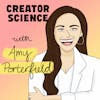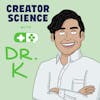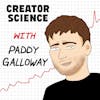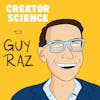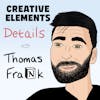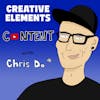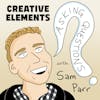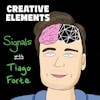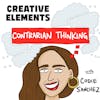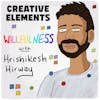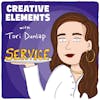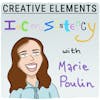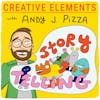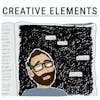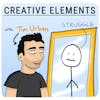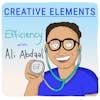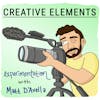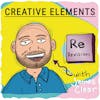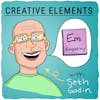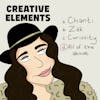
Chanti Zak has developed quizzes for Jenna Kutcher, Carrie Green, Rick Mulready, John Lee Dumas, Amy Porterfield, and many more.
Chanti Zak is a quiz funnel strategist and growth coach for online business owners, change-makers, and brands.
Chanti has developed quizzes for Jenna Kutcher, Carrie Green, Rick Mulready, John Lee Dumas, Amy Porterfield, and many more. Those quizzes have attracted hundreds of thousands of qualified leads and millions in sales for my clients and students.
In this episode, we talk about how Chanti got into quiz building, the different types of quizzes you can use, the steps to building your OWN quiz, and how Curiosity doesn’t just serve you but serves your audience as well.
Follow Chanti Zak on Instagram
Save 15% on Interact (use code ELEMENTS)
Join the Creative Companion Club
Subscribe to Creative Companion
Follow Jay on Twitter / Instagram/ TikTok
Check out our curated Playlists
Full transcript and show notes
***
SPONSORS
***
IF YOU LOVE CREATIVE ELEMENTS
Follow Creative Elements on Instagram
Subscribe to weekly episode emails
Leave a review on Apple Podcasts
***
ABOUT JAY CLOUSE
Subscribe to Creative Companion
***
FOR PODCASTERS
Enroll in my podcasting workshop
Enroll in my course on podcasting, Podcast Like The Pros
***
PODGLOMERATE NETWORK
This show is a part of the Podglomerate network, a company that produces, distributes, and monetizes podcasts. We encourage you to visit the website and sign up for our newsletter for more information about our shows, launches, and events. For more information on how The Podglomerate treats data, please see our Privacy Policy.
Since you're listening to Creative Elements, we'd like to suggest you also try other Podglomerate shows surrounding entrepreneurship, business, and careers like Rocketship.fm and Freelance to Founder.
Learn more about your ad choices. Visit megaphone.fm/adchoices
Chanti Zak 00:00
What I often see is that personality quizzes often will outperform other types of quizzes like assessments, or score based quizzes. I think simply because of the nature of our innate curiosity about ourselves.
Jay Clouse 00:18
Welcome to Creative elements, a show where we talk to your favorite creators and learn what it takes to make a living from your art and creativity. I'm your host, Jay Clouse. Let's start the show.
Jay Clouse 00:44
Hello, my friend, welcome back to another episode of creative elements. I gotta say, it feels good to be back in the recording and podcast creation flow. And I have some big, big projects underway right now that I can't wait to share with you. One of them is coming next week. I don't know if you can relate to this. I enjoy the creation process a lot. But I also get really antsy for projects to wrap up, it feels amazing to identify a problem or an opportunity and start working on the solution. But soon after I start working on a new project, I start thinking about the world after the project is done, the things the project will open up for me, and I get excited about that. But I can't just start living in that future world yet I have to finish the project. And so sometimes I get a little frustrated and even resentful towards that project itself because it is now the thing between me and this future that I'm so excited about. But of course, the project itself is the thing that creates that future. It's a complicated dance with my psyche. Anyway, one of the projects I just kicked off is a really important quiz building project. And this project has been in the back of my mind since my conversation with Tori Dunlap, the creator of her first 100k in my guest on episode number 88 of the show back in January. Tory is a powerhouse she has over 2 million followers on Tiktok 650,000 followers on Instagram. She is incredible. Now take a listen to this clip from our conversation when Tory was telling me about how she acquires email subscribers. This is one of the most quoted and remarked about snippets of audio from this show.
Tori Dunlap (herfirst100k) 02:20
It's 100% Tick Tock driving that traffic, literally I mean, this will blow your mind and you will appreciate this. We had a video go viral earlier this year that now is our most viral video. It has 6 million views. At the time. I think it had a couple million in a week. We got 100,000 email subscribers just from that video.
Jay Clouse 02:39
Crazy. And you're putting a CTA in that video like go to the link in my bio.
Tori Dunlap (herfirst100k) 02:42
Yep, go to link in my bio for our free quiz. Remember I was talking about Jenna Kutcher is quiz. It's almost like I made a note four years ago.
Jay Clouse 02:50
Yes, you heard that right. 100,000 email subscribers from a single video on Tik Tok. And what was the key to capturing over 100,000 email subscribers from that video, a quiz. Tory has a free quiz on our homepage to help you identify your money personality. And it's this quiz that Tor uses to drive traffic from social media into email. Email is a really big part of my business in the businesses of so many creators. And this really opened my eyes to the power of having a quiz as your front door to new subscribers. So I went down the rabbit hole. Who else is making quizzes? How do you make quizzes? This got me in touch with Josh Hainan one of the cofounders of a software tool called interact. I found out that a ton of creators who were building quizzes are using Interact as a software to power them. And Josh put me in touch with today's guest, Shaun T. Zack,
Chanti Zak 03:41
I'm the Chief Evangelist at interact, which is a fancy way of saying I get to learn from the people who hire and work with me what they're looking for what they want in their quiz, hosting software, report back to interact, and then they go and build it.
Jay Clouse 03:59
Shanti is the chief evangelist at interact. But she's also putting the majority of her time and attention into her own business, which helps creators like you and me to build their own quizzes. Not only does she help creators do this, but she's worked with some of the biggest creators out there creators who are known for being really good at leveraging quizzes.
Chanti Zak 04:18
One of my favorite examples is is Jenna Kutcher. I wrote a quiz for her back in when I was really just picking up steam and gaining momentum in this business. So I think it was 2018 2019 and it's on what's your secret sauce and and that's still right on her website. I have created so many quizzes for Amy Porterfield. And I just love her and her enthusiasm when it comes to quizzes. And I want to say to like not just front facing audience building quizzes, but quiz experiences within her programs. To create a better programming experience,
Jay Clouse 05:03
and that, my friends is where this comes full circle. The quiz that Jenna Kutcher has on our website that inspired Tori to build her own quiz was in fact created by Shanti. As you'll hear shortly, Shanti sort of stumbled into quiz building around 2017. I
Chanti Zak 05:20
think it was 2017 2018 that BuzzFeed came out and said their number one traffic source are their quizzes. New York Times even came out and said something similar, their quizzes were outperforming all of the other content that they were putting out there. There were a few third party quiz hosting software platforms at the time interact was one of the first and you know, I think Typeform had quizzes at the time too. They just weren't as popular as they are today.
Jay Clouse 05:57
So Shanti tried her hand at making a quiz for the company she was working with. And it did very, very well. So soon after, she began offering quiz building as a service and making quite a name for herself. Besides working with Jenna Kutcher and Amy Porterfield Shanti has worked with Rick mulready, John Lee Dumas, Copy Hackers and more. So in this episode, we talk about how Shanti got into quiz building the different types of quizzes, you can use the steps to building your own quiz, and how curiosity doesn't just serve you, but serves your audience as well. I'd love to hear your thoughts on this episode. As you listen, you can tag me on Twitter at Jay Clouse or on Instagram at Creative elements.fm. I see all of these I reshare them I love it. Let me know that you're listening. And by the way, if you're interested in creating your own quiz, the folks at interact are offering listeners of the show an exclusive 15% discount, go to Jay clouse.com/interact and use promo code elements. Not only will that save you some money on interacts paid plans, but it's an affiliate link, and you'll support the show. That's Jay clouse.com/interact and use promo code elements a link in that code or in the show notes. Okay, this is a great episode. So let's dive in and talk to Shanthi.
Chanti Zak 07:15
I was working in a restaurant as a cook, and had a baby and did not want to keep living the restaurant life. So I decided I would start a food blog. And I thought that would be my business. And it did not turn out that way. It's quite challenging to make a food blog profitable. And so that led me to writing articles for other people. So kind of, I guess, content, ghost writing to a degree, which was great fun. But I really struggled to again, like make that work as a business. And I know there are plenty of people who do make it work and plenty of super successful food blogs. But I was a total noob I had no idea. So I was sort of jumping from thing to thing. And I jumped from writing articles to copywriting. From my perspective, it seems people put a lot more value on that as a skill. So into the copywriting world
Jay Clouse 08:27
I went, what year did you start your food blog?
Chanti Zak 08:30
2014
Jay Clouse 08:32
Which feels early. What was going on the internet in 2014? Was food blogging? You know, was it already kind of popular and growing?
Chanti Zak 08:41
Absolutely. There's this website pinch of yum. They're a huge food blog. And they started a subscription membership service called food blogger Pro, which might still exist. And basically they would teach you the ins and outs of how to get your food blog up and running. What inspired me was their income reports they would every month disclose what they were making from this food blog. And it was outrageous. I just thought it was outrageous at the time was like six figures a month, posting mac and cheese recipes or other delicious foods. And that was it was starting to become a big thing. And you know, I think if I knew what I know now, I could have made it work. But I was getting had I had one recipe that had like 50,000 shares or something ridiculous but I didn't know how to take that traffic and build an email list or sell anything beyond ad space. So there there's a lot there's a lot to know even in those times.
Jay Clouse 09:57
Yeah different world entirely I'm sure because The tools for monetization must have been different, like even that blog that was showing their income reports. What was their monetization strategy? Was it just like Google AdSense?
Chanti Zak 10:10
It was ads. Yeah. Mostly and affiliate stuff.
Jay Clouse 10:15
Did they have their own cookbook?
Chanti Zak 10:16
I think eventually they they did. But at the time, I don't think so. You had an ebook, but no courses. Until that membership came out. It was really mostly ads. And affiliate was the main revenue sources.
Jay Clouse 10:33
So into the world of copywriting. You go, how did you start down that path?
Chanti Zak 10:38
Well, I got a mentor really early on, because I had no idea what I was doing. And I knew I needed someone to tell me if what I was creating was any good. And her advice was to work for free for a bit. And then, you know, incrementally start charging. Quite I think I wrote a sales page, my first sales page for like, $200 or something and probably spent two weeks.
Jay Clouse 11:12
No, right, like
Chanti Zak 11:14
so ridiculous. But having mentorship and having someone who had built a successful copywriting business, who knew what they were doing, look at my work as painful as that was, and dealing with all that criticism, and the learning curve. It was steep, but it's, it helps me grow really quickly.
Jay Clouse 11:41
What do you think about that advice for copywriters getting started today? Would you recommend to them that they do some projects for free and then start ratcheting up their prices? Slowly?
Chanti Zak 11:51
No, I don't recommend that. Anyone does projects for free, even if you're just starting out?
Jay Clouse 11:58
I agree. I agree with you. With the exception of I sometimes recommend people who don't have much of a portfolio to pretend that some big company they like hired them not say they actually hired them. But to do basically like spec work as if they had hired them to show their skills in a context of a big project. I remember there was a UX designer who published this post on Medium about how she redesigned Instagram. And if you look at that post, now, a lot of the stuff that she designed, you look at it, you say this just looks like Instagram, because they ended up doing a lot of things that she recommended years past, which is crazy. But that got me thinking like, yeah, you can build a pretty awesome portfolio of work that you weren't paid for that you also didn't give away for free. You were just showcasing your skills.
Chanti Zak 12:49
Yeah, I love that idea. And when I was first building my quiz business, I would reach out to brands that I wanted to work with. And I would go through their website, and I would come up with quiz ideas for them. And in the sense that's working for free, because I don't know if they're going to even respond to my email. But it actually works really well. Because that's a big thing to overcome, are coming up with the actual ideas. And to show someone that you have the skills is different from just saying that you have the skills,
Jay Clouse 13:26
for sure, for sure. Okay, well, let's talk about this, then when did your When did quizzes enter your world? And how did that become something that you really started to build a name and a brand around?
Chanti Zak 13:37
Yeah, so I was a freelance copywriter for about a year, year and a half. And I struggled a lot in those early days with getting clients consistently. So eventually, I saw this, this job offer for a full time position as an in house copywriter for Spiritual Development Company. And I applied and I got I got this position despite not having any of the criteria that they were looking for, they wanted like a degree in journalism or marketing or something. And somehow I talked my way out of that requirement, but I worked for them. And that's where I first dabbled with creating quizzes. So I created a quiz for that company that was just ridiculously successful. It performed so much better than any other lead gen strategy they had ever tried in the past or that I had experimented with while working there. So I knew that I was on to something and, you know, I was there for about a year left that company and I knew that If I'm gonna go out on my own again, I need a really solid niche. And I think this is something that could work.
Jay Clouse 15:07
What year was it that you made that quiz for that company? I think it was 2017. And what was going on in the zeitgeist, then that even brought the idea of a quiz to you?
Chanti Zak 15:18
Well, at that time, online quizzes were super popular, it was starting to become a popular strategy for online brands. But the model that they were based off was just this viral, shallow, sensationalist, fun time wasting thing, where, you know, you just want to escape life and discover which Powerpuff Girl you are. So they were out there, and I just had free rein to try out different things. And I thought, this might be fun.
Jay Clouse 16:02
Very cool. So you know, I'm thinking back to 2017. I feel like today, even in 2022, I'm just beginning to hear like more and more chatter around quizzes. And I listened to your podcast episode where they just titled everything you'd want to know about online quizzes. And it sounded like, you know, because you're so deep in this, it might seem to you, like we're five years into this thing, this isn't new, but to a lot of people and in my audience, listening to this quizzes, I think are still a pretty new concept for Legion, which is awesome. For, for us. And for you, our quizzes, a good fit for all creators, or is there a certain time when quizzes are really not a good fit? You know,
Chanti Zak 16:43
I usually don't recommend them as your first ever lead magnet, when you're just getting started when you don't really know who your audience is. Because the magic happens when you know who your people are, and you know what they have in common. But you also know what differentiates them. You know, a quiz is a really, it's a unique thing where you can meet people where they're at. So let's say you're a creator, and you serve total beginners, and folks who are quite advanced, those are two different ways of there are two different ways of communicating with those people in those different groups.
Jay Clouse 17:28
After a quick break, Shanti, and I start talking through the process of designing your own quiz. We even use my business as a specific example. So you can really wrap your head around how this looks. So stick around, and we'll be right back. Welcome back to my conversation with Shanti. Zak, before the break, Shanti was just beginning to give us an outline of how to design our own quiz. And I wanted to get very, very specific. So you can walk away with an idea of how to do this for yourself. I might use myself as an example, as we go through this conversation. Because what I've come to find out, even though to me, the niche of helping people become professional creators feels kind of niche upon first blush, it's actually super broad, because that could be YouTube, it could be email, it could be podcasting. It could be Instagram, it could be Twitter. And it's becoming clear to me, that I need to get even more sophisticated in identifying who is looking for what so that I can communicate to them the best way possible. And it seems like a quiz is probably a really good approach.
Chanti Zak 18:35
Yeah, absolutely. If you could determine which area your audience wants to focus in the world of being a creator online, whether it's writing, audio, video, those even just determining based on those three categories will be hugely beneficial for you and for your audience, because you would be able to then support them long term, knowing your goal is to become a professional creator who, mainly through writing, you get your ideas out there. So these are the best ways to do that. These are the podcast episodes that are specific to what you're looking for. These are the programs or offers that will meet you where you're at and give you what you need. Now you could go even deeper and and determine Are you already a creator online? Is this already your full time thing? Is this a side hustle? Is this just a dream? Because again, those categories require totally different messaging for each one.
Jay Clouse 19:52
I love that that's what gets me so excited because even this past week, I've been thinking I want to change the welcome seat bunch of emails I send to folks, which is just two emails. But I keep thinking through his lens of what is almost a best fit line of what I know about the general subscriber, which again, is hard because there are so many segments I'm aware of within it. And people listeners can probably relate to their own audiences, how many different particular avatars or segments you might be able to pull out from people who are following your work. And I'm starting to think, well, maybe instead of trying to do a best fit line that fits the median person, I can do a lot more upfront to understand these people, and then be even more specific, and then use that as a vehicle to share five of the 100 episodes of the podcast that are specifically tailored to somebody who's trying to build on Twitter, or somebody who's trying to create a digital course. So I think that promise of quizzes is really, really good. But then I start to think to myself, well, I need to make sure that the quiz serves the quiz taker, and not the quiz maker. How do you help people wrestle with that to make sure that the quiz they're developing isn't just, you know, insight for them, but it's actually helping the person on the other end?
Chanti Zak 21:05
Yeah. QUESTION I asked all of my clients and students is, what could you put in your quiz results that would absolutely delight your quiz taker, and exceed their expectations. Now, that's not as difficult with a quiz as it is for some other forms of content. Because I think people's expectations around what they're going to get in a quiz result are typically quite low. We're used to these BuzzFeed style quizzes where we get a one paragraph answer, and we move on with our day. So what does it look like to exceed expectations? The first thing I love to start with is creating an emotional response. And, and the way to do that, again, is by knowing your audience, and knowing like, what what are they struggling with. And this can be results specific, but it can also be broad. As creators, often we are struggling with some element of the imposter complex, we might have issues around, well, how can I really charge money for this is this even possible? There's all these societal and cultural ideas around creativity, and that that's a hobby, not a career. So there's a lot to work with there. And you as someone who have overcome many of those obstacles, you're you're a leader in that you can speak to them with confidence and say, you might be feeling this way. But there's so much hope. And there's so much possibility, and you have just tapped into a resource that will start to show you what is possible there. And and when you do that correctly, the person on the other end, feel something they feel something more than just neutrality and apathy and cynicism, which a lot of marketing methods out there create. So that is something I like to do in that first section. And it also creates a memorable experience. If you can inspire emotion, in the first few seconds that someone's reading that result. Think as Maya Angelou who said, people won't remember what you said, they won't remember what you did, but they will remember how you made them feel. And I believe that to be true. So that's your first section. And then you can paint the picture of All right, so this is not your average quiz result. I'm going to give you the answers to some of the questions that we may have teased in the title and description of the quiz, which we can talk about that too. But we want to hook people in and make them make them aware that this is worth their while. So you can give people some some actionable strategies, next steps based on where they're at, based on what you learned of them through the question experience. And that does two things. It positions you as an authority, it highlights your expertise, and puts you in the position of teacher and guide and mentor. And it also gives them actual stuff they can walk away with and implement and try out and feel like this was worth my time. So I always recommend having a section that does those things. I mean, I could just go on and on J I create like very
Jay Clouse 24:53
extra well let's let's let's pause for just a second because I do I do want to walk through Your process. So people who want to take and run with some of this on their own, they can. But I want to make sure I'm just following correctly. So let's say I'm sitting at home, and I'm saying, Okay, I know a quiz can be a really effective way of generating new email subscribers for me. What should my next step be? Should it be thinking about like, the hook should be thinking about a set of outcomes? How do I decide from that vantage point? What a good quiz result would be?
Chanti Zak 25:32
Yeah, so then you would want to start thinking about the hook and the big idea. So that brainstorming process, it looks like taking everything you know about your audience asking the question, well, what questions do do they ask me all the time? What do they want to know? If I could give them the gift of clarity on something that they're struggling with in relation to what I do and how I help people? What would that be? And then can we couch it in like, a fun, unique way that I think quizzes are often known for? Right? So to run with your business as the example, maybe you would come up with an idea of like, we could go with the obvious one, which is like, what's your creative personality type? What's your creative archetype? Like, anytime you're pulling personality into the conversation that's automatically intriguing, because we're human, and our egos often run the show. So we want to know about ourselves, and what makes us special and unique. But can you deepen that? Oh, the answer is almost always. Yes. So you've asked yourself, What does my audience want to know? And then you want to ask yourself, what do I want to be known for? So another question I often ask people at this phase of the creation process with the quiz is, if you were going to write a book, in the next six months, what would the central theme of that book be?
Jay Clouse 27:15
Wow, what a great question. Are you asking me? Sure. Oh, wow. Okay. I've been jamming on this idea that a lot of people, they hear about the idea of financial independence, and it's very attractive, because they think if I make enough money, I never have to work again. That's awesome. Of course, that's attractive. But people who achieve financial independence, then use that to explore choice and creative independence is what I call it. I like to encourage people to flip that on its head and say, if that's the what comes after financial independence, what if you tried to pursue that today? What if you just tried to design your life so that you were optimizing for creative independence? And what if by doing that, you actually created such great work that unlocked financial independence for you, too. That's what I would jam on his book in six months.
Chanti Zak 28:04
Wow, I just got goosebumps. That's a brilliant idea. I love how you're flipping that around. And it's so true. Often, it's financial independence first, and then I get to do what I love and have fun. Yeah. Okay. So if we were playing with that concept, I mean, like, you could be known for that you could be known for helping people create financial independence through creative freedom and independence, or, I mean, I'm sure there's a more succinct way of saying that. But so if we were to look at that, and we were to look at your audience, I think for, for me as a creative and I also work with a lot of creatives, there's a lot of confusion. And a big desire is to just have some clarity, and to just have a game plan.
Jay Clouse 28:58
Yes, so much shiny platform syndrome. It's like, should I be putting time over here? And also over here? I feel like if you could give that clarity and that certainty to say, You know what, based on what you've told me, it sounds like you enjoy writing, maybe you should focus on your email list and Twitter. If I could deliver that type of experience to people, it would be a banger.
Chanti Zak 29:18
Right? Yeah. So something around that paired with this idea of creative independence and creative freedom and and to be able to build a business or, you know, have that be a serious endeavor that's also super fun and aligned with what lights you up. So, general ideas that just come to mind for me would be like, discover your creative and financial independence. codecs. Like the idea of a codecs that it's this sort of full start to finish breakdown of of what you need. that some, some version of that could be the big idea. And then we deepen that messaging with a description along the lines of often people think that creative independence comes after financial independence. Let's flip that around. This is your starting point for discovering how you can use your existing strengths, gifts, talents, and the things you love most to create financial independence in your life. Take this three minute quiz, to get a full Codex, full breakdown of the exact next steps you need to take based on your current situation.
Jay Clouse 30:47
I love that you're doing this live, this is a lot of pressure I'm putting on you right now. And you're crushing it. So I see you and I appreciate you. So okay, I've realized that a quiz is a good lead magnet, I have brainstormed several big ideas have landed on one of them. What do I do next?
Chanti Zak 31:07
Okay, so now you look deeper at your audience, and who you want to attract. And we know what they have in common. They want clarity, and they want creative and financial independence. So now we look at what differentiates them. And we can use this to form the basis of what the end results will be. And I don't want to get too complicated here. But we can also use it as a basis for a segmentation strategy that has nothing to do with the results themselves. But that will inform you in your email marketing system around who's who, which you could then use to send specific messages, emails, finally,
Jay Clouse 31:59
let's say I'm a client of you and your team. And I come in and I'm so excited about my big idea. And I'm saying, okay, look, I have 18 different tracks, I could put people on, what is the threshold of too complicated that you would say, actually reel that back, you're going too far, you should actually probably focus on the range of this many different results,
Chanti Zak 32:22
the first thing I would tell you to look at is your end goal. And and there's nuance to this, because I imagine your end goal is actually to really help people for a long time and do good work in the world. And there's the there's like the big broad end goal, but then there's the strategic end goal of, well, I'd like to build my audience so I can get more people into my membership, or into my courses, and, you know, sell your offers. So I encourage, I would encourage you to look at what you are offering. And based on that. What are the different categories of people who would be interested? Who would join your program or your membership? I know, I think you have a membership, right?
Jay Clouse 33:12
I do. Yeah, I think for me, if I was building a quiz, just to keep this alive, ideation going. I think more important for me is actually just the subscriber knowing that maybe someday they'll become someone in the membership. But I actually just want to better serve them by being able to say like, Hey, based on what I know about you, this is what you should do, in terms of like podcast episodes, and in order, because actually, the podcast is what I want to grow the most. Because the podcast grows really, really big. I could build a whole business just on the podcast alone, I wouldn't even need my own digital products. And I'm looking at email as the best way to attract new podcast listeners, because I think I can acquire email subscribers much easier than podcast listeners in a performance marketing sense.
Chanti Zak 34:03
Yes. Okay. I love that you made that distinction. And for anyone listening, your goals might be totally different, right? It might have nothing to do with a specific offer or your podcast, you might actually just want to build your email list and practice the habit of writing a weekly newsletter and meeting people where they're at and helping them. So whatever your goal is, it's looking at that. And then from there, okay, so based on the context of the school that I have for the quiz, who do I want to attract and what categories would they fit in? So yes, there still might be 18 categories, right? long winded answer. If there's 18 categories, and you have 18 different results, and there are plenty of quizzes and assessments that that do have that many possible results. but it's a lot of work, it's a lot of work. So to make life easier for you, if you're doing this yourself, I tell people in this circumstance to look at all those different categories, can any of them be condensed, or any of them like hyper similar. So if you had a category for people who want to focus on writing content, people who want to focus on writing copy people who want to focus on writing poetry on Instagram, like all the different types of writing that you could do online, that would be many, many categories, right, but we could theoretically condense it into one category, which is writing. So looking at if you can condense it, if you can usually recommend to do so because once you get beyond working with like four or five possible results, things get a bit a bit more complicated.
Jay Clouse 36:01
What about the number of steps within the quiz? Because if I'm really trying to optimize for new subscribers, is there a threshold of too many steps where people are just like, you know, this is too much? I'm out?
Chanti Zak 36:17
Yeah, I think by steps, you mean questions?
Jay Clouse 36:20
Questions? Correct? Yes.
Chanti Zak 36:23
So typically, we will see a statistical drop off, after 10 questions that is meaningful, that's like, we have this kind of 10 question threshold, where it's, it's pretty balanced, and people are completing the questions. And then more than 10 questions, people drop off. So I typically recommend 10 questions or less. And that's actually a lot to work with, and get a lot of great insight from 10 questions. And you can also make sure people get the most relevant and correct results based on that number of questions.
Jay Clouse 37:06
When we come back, Shanti, and I talk about the lifespan of a well written quiz, the different types of quizzes you can create, and how to deliver results that really stand out right after this. Hey, welcome back, the more I have thought about building a quiz for myself, the more lost I felt in all the details, I felt a lot of pressure to get this thing, quote unquote, right from the beginning. But Shanti was really starting to alleviate that anxiety. So I asked her how easy it is to edit or update a quiz once it's been published.
Chanti Zak 37:39
It's so easy. And I recommend you constantly be iterating. And that is always evolving. And I think this is actually a major hang up that people have when they go to launch their quiz that they've worked so hard on is this idea that it has to be perfect. This might be my main lead gen source for years to come, I need to make sure it's totally dialed in. But it's so easy to make changes. It's so easy to go in and look at your analytics for your questions and see, oh, question three people are dropping off, people are having a hard time answering this question. I'm just going to change up the wording here, or shift things around. Or let's say you wanted to change up your segmentation strategy, because your your business has changed, your offers have changed. Again, so easy to do. So I always say like, get the minimum viable quiz out there, and then just be committed to iterating.
Jay Clouse 38:43
At what point in the process. If I'm developing my own quiz, do you think I'm most likely to get stuck in fall off?
Chanti Zak 38:52
The most common place I see people getting stuck? is there's this tendency to jump into creating the questions before you're clear on what the possible results will be. And that can be very, very confusing. It's fun, you create all these great questions. And then and then what you don't know how they connect to the to the results, that part's not clear. So I would say that's the most common place I see people get stuck. And the solution for that is so simple. It's just to create at least the framework for the results first to know what they are and what what identifiers fit each possible results. Before jumping into the
Jay Clouse 39:36
questions. This is already so helpful. So let me recap a couple of things. Start with the big idea. Look at your audience, the people you're trying to attract and come up with the results first, then questions preferably no more than 10 What other big parts of your process that you work with people on am I missing here?
Chanti Zak 39:59
Having have a vision, a game plan of what's going to happen after someone takes your quiz. I think that's really important. And something we don't always think about. So once someone is a subscriber, once you take the quiz, and they're on your email list, then what. And I always recommend having some sort of welcome sequence, some sort of, ideally, it's automated, so that someone joins your list, and they take your quiz. And it's really great. And they want to learn more, and they want to go deeper. And they have this curated experience now in their inbox that allows them to do that, and get to know you more. And you can deepen that relationship that you've established and show them what the best resources you have for them are. And so many other things. I mean, you said you wanted to redesign your, your welcome sequence. And I'm sure that's like a topic for another episode. But we could go there because it's, it's relevant to the conversation too. And it's something we don't, we don't often think about. So the common thing is like, Oh, they don't have my email list. And now they're just on my list, and I send out a weekly email. So they're just gonna get thrown into that. And there's no sort of first date, second date, third date, let's get married kind of thing. That's the most overused analogy in this conversation.
Jay Clouse 41:38
What I would love to do, I'm big on video right now. And it just seems like it'd be so elegant to have a quiz that gives people clarity on okay, you want to become a professional creator, let me give you some steps for how to do that. But also to land on a page that gives you those results, and then delivers a video that's also speaking to those results, I feel it can be such a good welcome experience. Because as a writer, I want people to read my writing in my voice. And so I'm constantly trying to find ways of how do I get people to actually recognize my voice. So when they're reading it, they are reading it as me, and being able to deliver a video right upon the point of subscription. And reading from me for the first time, I think is a really powerful lever. But I'm interested to hear if you have clients are people that you've seen do video, well, in the form of results.
Chanti Zak 42:28
Yes, 100%, I recommend that all of my clients and students have a video in their quiz results, and that they not just have the video, but that they also have a written breakdown that could summarize what's in the video. Because I think we need to cater to different learning styles. And so I think having both is really effective. And we talked about creating that emotional experience in the first section of your quiz result. Well, you can build on that with video in a big way. Because suddenly, we can hear your authentic enthusiasm around why you're so excited someone took this quiz and what they can do with everything that you're going to give them and their results. And what's going to happen next, like now that you've taken this now that you're here, I'm also going to pop into your inbox. And I have I have more cool stuff for you. So that creates an even deeper personal connection there. And I love what you said about people reading your your words in your voice. That's a great point.
Jay Clouse 43:49
Big agree on having both modalities of learning video and written text. I think it's really good. And some people end up watching the video and then reading texts. And I feel like that's even better, because now it's like reinforced right away. I took your quiz, which other people should take to it's linked in the show notes. And I got the signature quiz is what I'm ready for. And you have two different types of quizzes that you point out. One being a personality quiz, the other being an assessment quiz. Can you give a quick, high level differentiation on the two?
Chanti Zak 44:25
Yeah, and I should probably update my quiz results because there's also a hybrid of personality and assessment. But personality quiz, the core of it speaks to who someone is and in relation to whatever the subject of the quiz is. So you had Tori on and she talked about her money personality quiz. There you go. You can now discover who you are in relation to money and that is very very appealing, right? We've we want to know those things we want to know our, our personality when it comes to romantic relationships, our personality strengths when it comes to our careers, to our creativity to any number of facets within our lives. But there are certain niches where it feels weird to make a personality quiz, like, it doesn't feel like the most relevant thing. It doesn't feel like the thing your audience actually needs. And that's totally okay. And that's where the assessment quiz would come in. And I just want to bookmark the personality quiz here for a second and say that what I often see, and the small amount of research that's been done on online quizzes is that personality quizzes often will outperform other types of quizzes like assessments, or score based quizzes, I think simply because of the nature of our innate curiosity about ourselves, and and the appeal of that never really dies.
Jay Clouse 46:10
I have a assumption, and will you tell me if you agree with that, or have knowledge to back it up? My assumption for why personality quizzes would outperform? Is because I'm guessing that's more likely to be shared in terms of the results, because people want to share something about them. And that's more likely also, to not paint them in some sort of negative or like, staged light.
Chanti Zak 46:36
Absolutely. Yeah. And Sherry Turkle who's a researcher at MIT, she's an interesting research on that topic with personality quizzes specifically, and that the viral effect that they have. And what she highlighted is that people don't want to share the quiz result if it reflects them in a negative light. So again, you have that initial section of your quiz, where you want to be focusing on the positive and building people up, and they are going to be far more likely to well, like you, and have good feelings toward you, but also to share that quiz with their social network and friends and
Jay Clouse 47:25
peers. This was my assumption. And this is where I got a little bit stuck. Because, of course, given my goals that I've shared with you of wanting to get more email subscribers, virality would be a pretty great perk of the quiz. But from the thinking I've done so far, it seems like I could best help people and put them on a path to helping themselves with something that's closer to an assessment type quiz, which is less likely to be shared. So how would you advise I navigate that tension?
Chanti Zak 47:54
Well, we could look at this idea of the hybrid between the personality and be assessment, quiz, which is what I've been experimenting with a lot with clients, because almost always, there is a personality element. But you also want to give people that experience of getting the support and resources and insight that they need. So when it comes to creating the framework for personality, you know, there are so many lenses that we could look through, there's Myers Briggs, there's Enneagram, there's astrology, there's the ocean assessment, there's just so many. So what I usually recommend is put all of those to the side, you do not have to be an expert in any of them. What you need to be an expert in is, again, your own audience. So for you, what personality types do you tend to attract? What personality patterns do you see come up again and again, in the people that you work with and help?
Jay Clouse 49:10
Well, I see a lot of creative, ambitious people who sometimes have a hard time holding themselves accountable to being consistent. And I also see a lot of shiny object or even shiny platform syndrome, where they get excited about a new modality or a new platform and they want to try that out. Those are two major ones that come to mind.
Chanti Zak 49:33
What just came up for me, as you're explaining that, and through my own understanding of of the broad spectrum of creatives and anyone who wants to do creative work in the world. I think there's there could be something around, introverted extroverted and be verted. In terms of the medium that someone is most drawn to, I don't know if you've seen this. But and this is totally an assumption because I don't I don't know, right, I don't know your audience with great intimacy. But for me, I identify as an ambivert, I am quite happy to be behind the scenes, and right in my little writing cave, and avoid video at all costs when I'm in introvert mode. And then I can get into extrovert mode, or I'm like, totally excited to get on a podcast with you and be on video and or do a live webinar or something. Just kind of, I can play with both of those mediums. Someone who's super introverted, might have a much harder time getting on a live webinar on or doing a YouTube live stream where people are just commenting away. And maybe they're more more partial to, like a super intimate podcast, audio only, or writing. Is that do you think that's semi fair assumption to make? Like, it's not going to be applicable to everyone?
Jay Clouse 51:15
Yeah, there's something there for sure. And there's some perfectionist tendencies that hold some people back too. But on the other side of the spectrum, some people are, so move fast and ship a ship a ship at that they're actually not putting enough effort into making the work valuable to the reader. So I'm definitely starting to see how it can break some of these things down. For, for my audience, that it sounds like the hybrid makes some sense, because even if I'm giving somebody an assessment, I am at least categorizing them in some way to know what results to deliver them to give them, you know, next steps to make, right so it seems like you can use those bones and make it fun and give them something that is positive as a positive frame of looking at it for their personality, while still giving them some assessment type next steps.
Chanti Zak 52:05
Yes, exactly. And it's a big can of worms. And there's like so much to look at when it comes to personality. But ultimately, you know, your audience and you know the types of people who are in your audience and how you can best help them. So sort of combining both of those things will help you create that successful hybrid between the personality quiz and the assessment. And and then you can have fun with it. Like there's, there's no limit to what you creatively can put into your quiz experience.
Jay Clouse 52:41
So if I put the time effort resources into developing the signature Quiz, How long can I expect that to work for me as a good front door into the creative companion ecosystem?
Chanti Zak 52:54
I think that question has a lot to do with the amount of intention and research and, and effort that you put in up front. So I asked that question of if you are going to write a book, what would it be about? What do you want to be known for? You'd like if you can look into the future for the next two, three years, what do you see your focus being. And if you can pull that core theme into the quiz, then it can be a central part of your, your strategy for bringing that future vision to fruition. It's also really easy to, to just say like, Oh, I'm gonna create this like super fun, easy quiz and put it out there and then move on to something else, some totally different subject matter. And then it's not going to be relevant anymore. But what I'm always aiming to do when creating this asset for people, or or guiding them through creating it for themselves, is to have the intention that this is going to be with you for at least two, three years.
Jay Clouse 54:05
If somebody's listening to this, and they're ready to dig into creating their own quiz, where should they go to get started?
Chanti Zak 54:12
You can take my super meta quiz that tells you what type of quiz you should create for your business that day took and got the signature quiz. So I'm curious what your listeners will get. And that's a really good starting point. And then I have trainings, I have free courses, which once you take the quiz will be in my world and you will find all of those things.
Jay Clouse 54:49
This was really fun to get into the weeds in this conversation about how you and I can build quizzes for our businesses. I really put Shanti on the spot asking her specific questions based on my business And she really answered the call. So much. So in fact that since this interview, I've actually hired Shanti to work with me and develop the quiz that we began to outline here in this episode. I'm really excited about this. And once this quiz is finished, I'll be having Shanti back on the show to talk about the process we went through to get this thing published, so that you can see the full process from beginning to end, and then experience the quiz for yourself. If you want to learn more about Shanti, you can find her at Shanti Zak on Instagram or go to Shanti zak.com to take her very meta very good quiz about building quizzes. I can't recommend it enough. And links to both are in the show notes. And remember, if you want to create your own quiz, the folks at interact are offering an exclusive 15% discount to listeners of the show. Just go to Jay clouse.com/interact and use promo code elements. Not only will that save you some money on interacts paid plans, but it's an affiliate link so you'll be supporting the show to that's Jay clouse.com/interact Use promo code elements interact is the tool that I will be using when this quiz is up and running. Thanks to Shanti for being on the show. Thank you to Emily Klaus for making the artwork for this episode. Thanks to Nathan town 100 for mixing this show and Brian Steele for creating our music. If you'd liked this episode, you can tweet at Jay Clouse and let me know if you really want to say thank you. Please leave a review on Apple podcasts or Spotify. Thanks for listening, and I'll talk to you next week. A Sonic universe
Most Popular Episodes
New to the show? Check out some of our most popular episodes.






